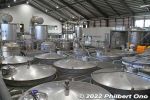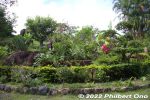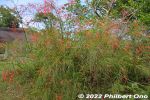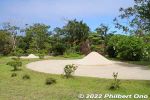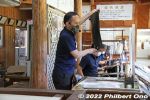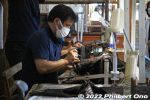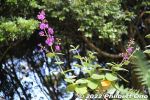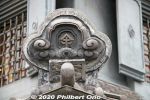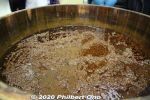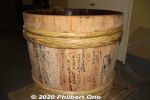 Image search results - "factory" Image search results - "factory" |
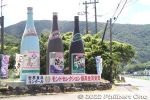
Local brewery producing brown sugar shochu in Tatsugo Town, Amami-Oshima. Uses brown sugar wholly produced in Amami-Oshima. Water comes from Jougo River (じょうご川) fed by an aquifer 120 meters underground. Factory tour and gift shop.They sell three shochu brands: Takakura (高倉), Hama-Chidori (浜千鳥乃詩 原酒), and Jougo (じょうご). https://www.jougo.co.jp/
|
|
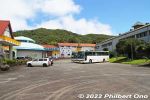
When you enter the premises, the factory is on the right, and gift shop on the left. Address: 鹿児島県大島郡龍郷町浦1864-2
|
|

Amami Oshima Shuzo shochu factory.
|
|

300-year-old tree named Sharinbai next to the shochu factory. Used for tsumugi fabric dyeing.
|
|
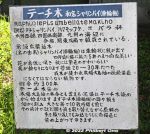
About the old Sharinbai tree.
|
|
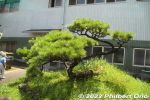
Pine tree next to the shochu factory.
|
|
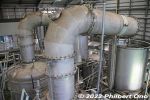
We had a guided tour of the shochu factory.
|
|
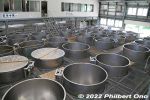
Vats
|
|
|
|
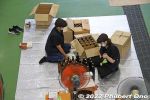
Packing process. Bottles of shochu being boxed.
|
|
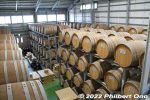
Casks for aging.
|
|
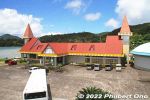
Amami Oshima Shuzo gift shop
|
|

Amami Oshima Shuzo gift shop shochu tasting.
|
|

Amami Oshima Shuzo gift shop sells mainly shochu.
|
|
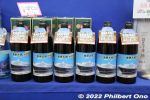
Amami Oshima Shuzo bottles of shochu with a cruise ship label (for visiting cruise ship passengers).
|
|
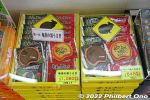
Confection in the shape of the Amami rabbit (Kuro-usagi). Amami-Oshima, Kagoshima
|
|
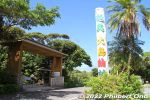
Oshima tsumugi is a local fabric woven from white silk and dyed. Oshima (Ooshima) Tsumugimura is a small textile factory where you can see how they weave and dye the tsumugi fabric. They also sell tsumugi fabrics as kimono, handkerchiefs, etc.
|
|
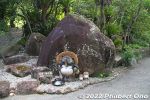
The factory is in a subtropical garden with tropical flowers and plants. Adult admission ¥500, open every day 9 a.m. to 5 p.m.Address: 1945 Akaogi Tatsugo Oshima, Kagoshima
Local buses stop at Oshima Tsumugimura bus stop. (From Amami Airport, 30 min. by bus.) http://www.tumugi.co.jp/
|
|
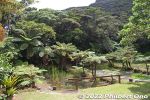
Tropical garden setting for this fabric factory. Oshima tsumugimura, Amami Oshima.
|
|

He is dyeing Oshima tsumugi silk fabric in mud.
|
|
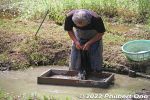
He is dyeing Oshima tsumugi silk fabric in mud. The fabric color becomes black. Amami-Oshima island, Kagoshima.
|
|
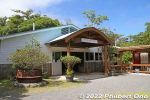
Oshima (Ooshima) Tsumugimura
|
|
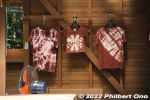
Tie-dyed (in mud) handkerchiefs. The fabric is also dyed with the sharinbai tree containing iron and tannin.
|
|
|
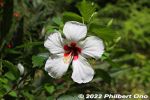
White hibiscus on Amami Oshima.
|
|
|
|
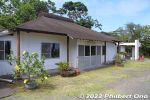
Oshima (Ooshima) Tsumugimura fabric factory.
|
|
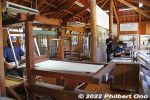
Inside the Oshima (Ooshima) Tsumugimura fabric factory. A few workers demonstrated the production of tsumugi silk fabric. This weaving step is called shimebata to make patterns on the silk.
|
|
|
|
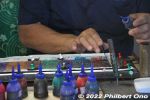
Fabric dyes.
|
|
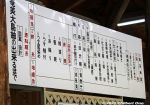
Oshima tsumugi fabric production steps.
|
|
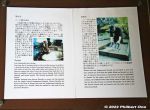
Explanation of the Oshima tsumugi dyeing process.
|
|
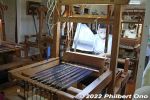
Loom
|
|

Loom to weave Oshima tsumugi.
|
|
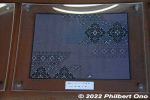
Sample Oshima tsumugi fabric with in the typical black color.
|
|
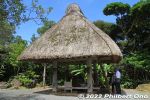
Takakura storehouse with a steep thatched roof. Amami's traditional structure for storing grains. Oshima tsumugimura, Amami Oshima, Kagoshima. 奄美の高倉
|
|
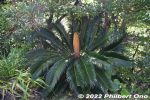
Sago palms with a cone. Oshima Tsumugimura, Amami Oshima, Kagoshima. ソテツ
|
|
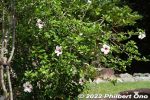
White hibiscus
|
|
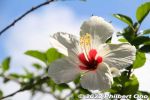
White hibiscus
|
|
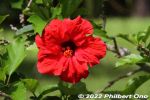
Red hibiscus and other flowers in the tsumugi factory's garden setting. Amami Oshima, Kagoshima
|
|

Sago palms, Amami Oshima, Kagoshima
|
|
|
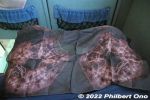
Oshima tsumugi handkerchief I bought for myself. Tie-dyed.
|
|
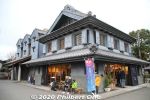
Kinbue Syoyu Park offers a factory tour of their soy sauce (shoyu) factory operated by Fueki Syoyu Brewing Co. (笛木醤油株式会社). Their shoyu products are sold under the "Kinbue" brand name (金笛). They've been in business since This traditional building houses a gift shop and restaurant.
|
|
|
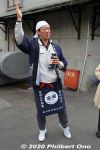
Our factory guide was Fueki Masatsugu, the 12th-generation proprietor of the shoyu brewing company.
|
|
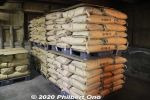
Soybeans
|
|
|
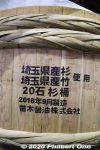
Kinbue also makes large wooden vats for shoyu making.
|
|

Fueki Masatsugu explains about a large vat of what will become soy sauce.
|
|
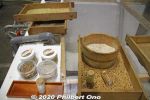
The ingredients used in making shoyu. Lots of soybeans and salt.
|
|
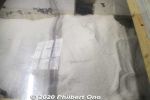
Lots of salt.
|
|
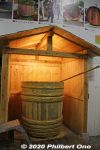
A sample vat that we could mix using a long stick.
|
|
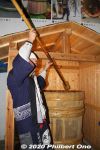
He showed us how to mix the vat.
|
|
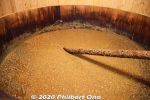
Inside the vat of fermenting shoyu.
|
|
|
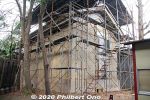
Old warehouse.
|
|
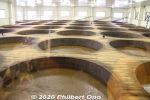
Large wooden vats where the soy sauce is fermented and aged.
|
|

What the vats look like down below.
|
|
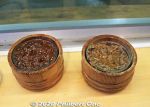
Different stages of fermenting. We could taste the difference.
|
|
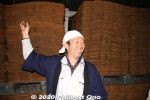
Waste materials from making shoyu.
|
|
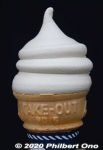
Shoyu soft-serve ice cream.
|
|
|
|








